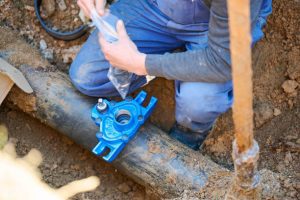Introduction: Why Hard Water Shouldn’t Be Ignored
Homeowners often overlook hard water, but it can silently damage your plumbing. Hard water contains high mineral content, especially calcium and magnesium. These minerals build up inside your plumbing fixtures and pipes. Over time, this buildup leads to significant damage and increased maintenance costs. Although hard water might seem harmless, its long-term effects can be costly. Every time you shower or run the dishwasher, minerals cling to surfaces. As a result, pipes become narrower and less efficient. Eventually, this mineral buildup can cause clogs and even pipe bursts. Fortunately, recognizing hard water early can help you avoid these problems. Understanding its impact is the first step toward long-term plumbing health. In this post, we’ll explore how hard water damages your system and what you can do to fix it. By taking preventative steps today, you’ll protect your home’s plumbing for years. Let’s dive into the effects of hard water and how to prevent them.
How Hard Water Damages Your Plumbing
Hard water leads to a process called scaling, which harms your entire plumbing system. Scale buildup restricts water flow inside your pipes. Over time, this strain shortens the lifespan of plumbing fixtures and appliances. You’ll likely notice lower water pressure in sinks and showers. Additionally, scale deposits collect inside water heaters, forcing them to work harder. This results in higher utility bills and reduced efficiency. In some cases, the buildup can cause permanent damage to the unit. Even washing machines and dishwashers suffer from mineral accumulation. As appliances wear out faster, you’ll spend more on repairs and replacements. Moreover, hard water leaves visible residue on faucets and showerheads. Although this might seem like a cosmetic issue, it signals internal buildup. Ignoring these signs can eventually lead to costly plumbing repairs. For this reason, homeowners should take hard water seriously. Understanding the effects helps you take timely action and avoid future headaches.
Recognizing the Signs of Hard Water
Identifying hard water early is essential for preserving your plumbing system. The signs are often visible around your home. First, check your faucets and showerheads for white, chalky residue. This crust forms from mineral deposits left behind after water evaporates. You might also notice that your soap doesn’t lather well. That’s because minerals interfere with the effectiveness of soaps and detergents. Clothes washed in hard water may feel stiff or scratchy. Over time, fabrics even begin to fade faster due to mineral buildup. Your skin and hair may feel dry after bathing, which is another common indicator. If your water heater runs inefficiently or makes noises, minerals may have collected inside. Low water pressure is another red flag that often points to restricted pipes. Keep an eye on these issues, as they worsen over time. Recognizing these signs helps you address hard water problems early and avoid major repairs.
Solutions to Combat Hard Water
There are effective ways to combat hard water in your home. Installing a water softener is the most common solution. Water softeners remove minerals like calcium and magnesium from your water. This prevents buildup and extends the life of your plumbing. You can choose from salt-based or salt-free softeners, depending on your preferences. Salt-based models use ion exchange to soften the water. On the other hand, salt-free systems use filters or conditioners to neutralize minerals. Another option is to install a point-of-entry filtration system. This treats water as it enters your home and protects all plumbing fixtures. Regularly flushing your water heater also helps reduce mineral buildup. Cleaning faucets and showerheads with vinegar removes visible deposits. Though these actions might seem small, they prevent bigger problems over time. You should also schedule annual plumbing inspections to catch early signs of scaling. Taking these steps ensures better water quality and plumbing longevity.
Conclusion: Protect Your Plumbing from Hard Water Damage
Hard water may seem harmless, but it causes lasting damage to your plumbing system. Mineral deposits build up quietly, affecting both water flow and appliance efficiency. Fortunately, homeowners can take proactive steps to address this issue. By recognizing the early signs, you can act before damage becomes severe. Installing a water softener and performing regular maintenance makes a significant difference. These simple upgrades help extend the life of pipes and plumbing appliances. Not only do they save you money, but they also improve water quality. As a result, your home stays more comfortable and efficient. Now is the perfect time to assess your home for signs of hard water. If you need expert help, Pure Plumbing Solutions CA offers reliable water treatment services. Don’t wait until your pipes are clogged or your appliances break down. Instead, invest in prevention today and protect your plumbing for the future.
Interested in reading about The Science Behind Water Heaters: Choosing the Right Type for Your Home?





